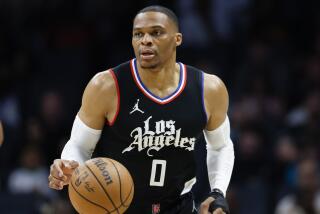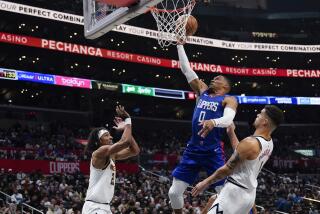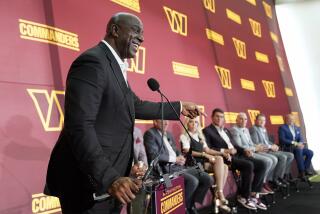Contrite, defiant Sterling only fuels further outrage
In an extraordinary television interview that deepened the anger over his ownership of the Clippers, Donald Sterling attacked Lakers great Magic Johnson, suggested that African Americans have not done enough to help their community and blamed the media for creating the turmoil that envelops his team and his family.
Sterling’s attempt to show contrition in his first public comments since he was banned from the NBA two weeks ago featured several broadsides against Johnson, one of the most beloved figures in American sports. Sterling also insisted that players, fans, sponsors and fellow owners continue to support him.
Alternatively apologetic, defiant and seemingly on the verge of tears, Sterling said he believed he can maintain his hold on the team he has owned for 33 years.
Although small portions of the interview had been released Sunday, the bulk of the conversation that aired Monday on CNN redoubled calls for Sterling to be expelled from the pro basketball league, just as the team is in the midst of its most successful season.
“He’s in a hole and he won’t quit digging,” Los Angeles City Council President Herb Wesson said.
Civil rights activist and commentator Earl Ofari Hutchinson said Sterling had denigrated an iconic figure in the black community, adding, “It’s almost attacking Mt. Rushmore.”
Sterling’s wife, Shelly, chimed in from New York, where she is expected to appear on NBC’s “Today” show Tuesday: “These are the ravings of a sick, delusional man.”
NBA Commissioner Adam Silver, who already apologized to Johnson for Sterling’s initial remarks, issued another apology late Monday for “a malicious and personal attack” on Johnson. “The NBA Board of Governors is continuing with its process to remove Mr. Sterling as expeditiously as possible,” he said.
The controversy began April 25, when the gossip website TMZ posted an audio recording of Sterling telling a frequent courtside companion, V. Stiviano, that she should not be photographed with black people and should not bring them to Clippers games. Sterling chastised her after seeing a picture she posted on Instagram of her posing with Johnson.
Days later, Silver fined Sterling $2.5 million, banned him from the league and called on other owners to force Sterling to sell the team he bought in 1981. Last week, the league appointed an interim chief executive to oversee the Clippers. Dick Parsons, former chairman of Citigroup and Time Warner, arrived in Los Angeles on Monday. He said he hoped to bring calm and stability to the Clippers. His comments were only a few hours old when CNN broadcast Cooper’s interview with Sterling.
Sterling touched on many subjects, and although he expressed remorse, he suggested that Stiviano, 31, had provoked him. “I was baited,” he said. “I mean, that’s not the way I talk.”
His harshest comments were aimed at Johnson, whom the Clippers owner also accused of setting a poor example for children and of recently misleading Sterling, perhaps in a bid to buy his NBA team.
“What does he do for the black people? He doesn’t do anything,” Sterling said in the CNN interview, conducted in the billionaire’s Beverly Hills home. At another point, he added: “Can you tell me, big Magic Johnson, what has he done?”
“Jews, when they get successful, they will help their people,” said Sterling, who is Jewish. “And some of the African Americans — maybe I will get in trouble again — they don’t want to help anybody.”
Sterling said that Johnson had urged, just after the recording became public, that the Clippers owner not say anything. “I think he wanted me just to do nothing, so he could buy the team,” Sterling said. “He thought maybe the whole thing would be resolved in two weeks.”
Sterling attacked Johnson for being promiscuous during his playing days in the NBA. “Here is a man who is — I don’t know if I [should] say this. He acts so holy,” Sterling said. “I mean, he made love to every girl in every city in America. And he had AIDS.”
Johnson announced in 1991 that he had the virus that causes AIDS, but never contracted the disease. He previously apologized for having unprotected sex with many women, which he said led to his illness. He subsequently has been heralded by HIV activists for using his celebrity and his wealth to help enhance efforts to control the disease.
Johnson, part of the group that purchased the Los Angeles Dodgers, founded the Magic Johnson Foundation in 1991. It has granted about $20 million to organizations that work on HIV-related issues, providing scholarships and technology to community centers, among other things.
Johnson has been praised for bringing businesses like Starbucks and restaurants to underserved minority communities around the country. His theater complex in South Los Angeles has added jobs and entertainment options to an area that badly needed both.
More recently, Johnson teamed up with Canyon Capital Realty Advisors, a Century City investment fund, to develop properties in urban neighborhoods. The Canyon-Johnson Urban Funds targeted $8 billion for development and revitalization in major U.S. metropolitan areas, managers said.
Sterling said that reports of players, fans and sponsors hating him were concocted or exaggerated. “The media hates,” he said. “The media — it’s all the media pushing it.”
Cooper responded: “You really believe that it’s just the media?”
“I believe it 100%,” Sterling said.
He said he based this on feedback he had received: “People call me by the thousands and give me support.”
Sterling, 80, made a fortune estimated at $1.9 billion in the apartment rental business.
He said he did not think the other 29 NBA owners would vote to strip him of the Clippers, as Silver has asked them to do.
Sterling said he loved and respected the other owners and felt remorse for dragging them into the scandal. “I have — I embarrassed the league,” he said. “I humiliated them. I don’t know how, why I did it. I mean, it’s so terrible.”
He was vague about whether he would go to court to try to stop the owners if they voted to oust him, though he suggested he did not want to oppose their will, adding: “I don’t want to fight with my partners, you know?”
Sterling became most emotional when asked to discuss his feelings for Stiviano. He described her as a “street person” who helped raise a family of 15 and whom he admired for that. He said he remained confused why she had recorded their argument about Johnson and blacks. “I mean … an 80-year-old man is kind of foolish,” he said. “And I’m kind of foolish. I thought she liked me and really cared for me. I guess being 50 years, 51 years over — older than her, I was deluding myself.”
Sterling denied that he was a racist and said that a quarter of the team’s fans were African American and that he appreciated them. He said he only raised the issue of blacks coming to games with Stiviano after she told him, “I’m going to bring four gorgeous black guys to the game.”
Sterling said that somehow triggered his “stupid, uneducated remarks.” He added: “I was a little jealous, I have to admit.”
Meeting with Clippers employees and the media for the first time since being named interim CEO, Parsons said at Staples Center that his role is to provide a “steady hand,” while the NBA proceeds with its attempt to strip Sterling and his family of ownership.
He said advertisers should begin to return to a team that many spurned after Sterling’s remarks.
He also expressed confidence that Coach Doc Rivers and players will not abandon the team because they have seen the “clarity and the swiftness” of the NBA’s sanctions.
Parsons said the determination in the eyes of Commissioner Silver persuaded him that the Sterling era would come to an end.
“My goodness,” Parsons said. “There’s so much momentum for doing the right thing and so much support for doing the right thing that at the end of the day, I believe ownership will change.”
soumya.karlamangla@latimes.com
Times staff writers Alicia Banks, Mike Bresnahan, Stuart Pfeifer and Roger Vincent contributed to this report.
More to Read
Start your day right
Sign up for Essential California for news, features and recommendations from the L.A. Times and beyond in your inbox six days a week.
You may occasionally receive promotional content from the Los Angeles Times.








